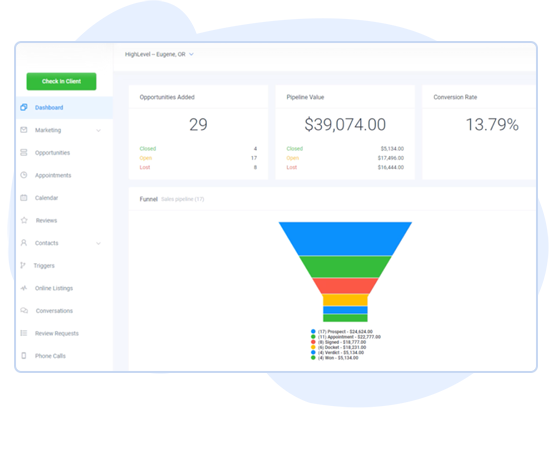
Angela Hall
Effortlessly engage, convert, and retain customers with our cutting-edge automation tools. Build stronger customer relationships, boost your marketing ROI, and grow your business like never before.

Earning Potential
Discover the vast earning potential and pathways to success in affiliate marketing.

Diverse Products
Explore the importance of niche selection and promoting diverse products as an affiliate.

Content Creation
Learn how to create compelling content that engages and converts your affiliate marketing audiences.

Tracking Metrics
Optimize your affiliate marketing campaigns by effectively tracking and analyzing key performance metrics.

Relationship Building
Build strong relationships and strategic partnerships to enhance your affiliate marketing business.

Legal Considerations
Navigate the legal landscape of affiliate marketing and ensure compliance with regulations and policies.
The #1 Automation & Text Messaging Platform For Small Businesses
The first ever platform built to manage a Business's Follow up, two-way texting, pipeline, scheduling, and so much more.
Built for Agencies, By an Agency.
Your End-To-End Funnel Marketing Solution
Build forms and funnel pages to capture leads, user automated sms, email, phone calls, voicemails, and Facebook Messages to nurture leads through custom pipelines, converse with leads & clients via text, phone, and Facebook Messenger (all in one stream!), and more!

Disclosure and Transparency
Ethical affiliate marketers prioritize transparency and disclose their affiliations to their audience. They clearly state that they may receive a commission or other benefits when promoting or recommending products or services. This disclosure helps build trust with the audience, ensuring they are aware of any potential biases and can make informed decisions.

Genuine and Honest Recommendations
Ethical affiliate marketers focus on providing genuine and honest recommendations to their audience. They only promote products or services that they believe in and have personally used or extensively researched. Their content provides accurate and unbiased information, highlighting both the pros and cons of the recommended products or services.

Adding Value and Solving Problems
Ethical affiliate marketers aim to add value to their audience’s lives by addressing their needs and solving their problems. They create high-quality content, such as product reviews, tutorials, or comparison guides, that educates and informs their audience. By focusing on helping their audience make informed choices, they prioritize the long-term relationship over short-term gains.
What is affiliate marketing?
Affiliate marketing is a dynamic online business model where individuals or companies earn commissions by promoting and selling other people’s products or services. It operates on a performance-based system, allowing affiliates to earn a percentage of the revenue generated from their referrals. By leveraging their online platforms, such as websites, blogs, or social media channels, affiliates drive traffic to the merchant’s website and encourage potential customers to make a purchase.
This mutually beneficial arrangement benefits all parties involved: affiliates earn passive income, merchants expand their customer base, and consumers receive valuable product recommendations. Affiliate marketing has become a popular avenue for entrepreneurs to monetize their online presence and generate income. Affiliate marketing can be used ethically when certain principles and practices are followed.
Overall, ethical affiliate marketers prioritize transparency, honesty, and providing value to their audience. They maintain integrity in their recommendations and ensure that their marketing practices align with the best interests of their audience.
Get Free Consultation
We’ve Been Building For Over 20 years
Lorem ipsum dolor sit amet, consectetur adipiscing elit. Nullam lectus erat consectetur eu sapien eget, rhoncus consectetur sem.



Build Forms & Landing Pages To Capture Leads
Use our drag-and-drop form and funnel builders to create landing pages that convert traffic to leads that get stored in HighLevel.

Convert Leads With Robust Automations
Nurture your leads through automated sequences that guide them through the customer journey. Our automation tools help you convert prospects into loyal customers without missing a beat.

Convert Leads With Robust Automations
Build custom nurture campaigns that send text messages, emails, voicemails, and even Facebook messages to convert leads automatically.

Converse With Leads & Customers In One Place
Manage all customer interactions within a single, unified inbox. Keep track of conversations, respond promptly, and build stronger customer relationships.



Converse With Leads & Customers In One Place
Keep track of conversations whether they happen via text message, email, phone calls, or Facebook messages. Two-way text included!

Build & Manage Your Online Reputation
Monitor and manage your online reputation to ensure your business remains credible and trustworthy. Respond to reviews and gather customer feedback in real-time.

Build & Manage Your Online Reputation
Send review requests via SMS and email with the push of a button. Monitor and reply to new reviews right within the dashboard.

Complete Advanced Analytics Dashboard
Get insights into your marketing performance with advanced analytics. Track conversions, customer interactions, and more, enabling data-driven decisions for business growth.


Complete Advanced Analytics Dashboard
The ability to track the ROI and Leads in a pipeline has become even easier through our advanced Dashboard. Track stats such as appointment rates, campaign effectiveness, and even response rates!

Automatic Calling
When a Lead comes in, you can automatically push a phone call to the lead

Ringless Voicemail
Drop a voicemail to any contact automatically using a pre-recorded message

Full Message
Follow with an automated SMS and Email that can be scheduled at any pre-determined window.

Seamless Integrations with Leading Tools
Our platform integrates seamlessly with top tools and software, empowering you to work efficiently.










Jane Doe
Using this platform has transformed our business. We’ve increased lead engagement and improved customer retention with automation tools that work flawlessly. I can’t recommend it enough!

© Copyright 2026. That Helpful Chick. All Rights Reserved.

"As a business owner, it is always important to know the numbers and statistics in your company. To know your best clients, programs, what is working or not working. Many of us spend years and thousands of dollars on software that we think will help, and spend too much money, time and effort to implement. And if we can’t understand it all, we have to invest/pay another person to understand and implement it all.
As a subscriber to multiple software platforms to keep our businesses at the forefront of the industry, I can truly share this software developed by High Level, makes my job as the CEO a simpler one. Meaning I can see new clients coming in the door from multiple resources, our company follow up, conversions, current client’s information, sales, and special offers in one place."
Christina Nelson